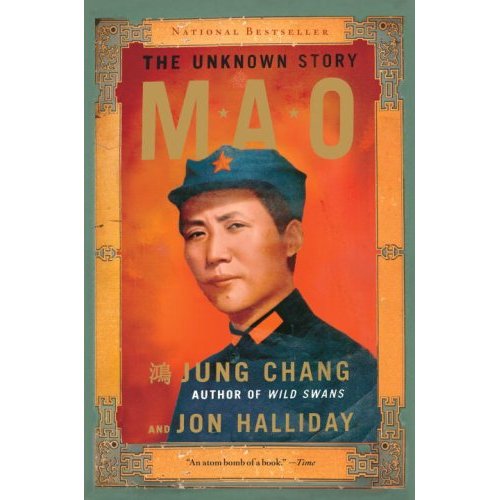 Powerful Biography Lays Millions of Deaths at Mao’s Feet
Powerful Biography Lays Millions of Deaths at Mao’s Feet
The first sentence of the acclaimed biography, Mao: The Unknown Story, couldn’t be more to the point: “Mao Tse-Tung, who for decades held absolute power over the lives of one-quarter of the world’s population, was responsible for well over 70 million deaths in peacetime, more than any other twentieth-century leader.”
What follows is a 616-page, meticulously researched compilation of Mao’s rise to power and the atrocities he brought down upon the Chinese people. The book, written by Jung Chang and Jon Halliday, catalogs Mao’s ruthlessness and paranoia and narcissism and extravagant lifestyle, even in the midst of a country where so many went hungry. The section of the book that sticks with me today, two years after I first read it, deals with the Great Famine, in which millions starved to death because Mao and his cronies took much of the grain and shipped it off to the Soviet Union in exchange for military technology. Mao would do anything and sacrifice any number of lives to turn China into a superpower, even if it meant stealing grain from the peasants who grew it.
The famine became so bad that people resorted to eating dirt in a desperate search for nutrients, many of them dying when their intestines became blocked. In an effort to squeeze more and more production out of the land and the people, Mao boosted quotas and ordered the peasants to dig massive irrigation systems, “moving a quantity of earth and masonry equivalent to excavating 950 Suez Canals, mostly using only hammers, picks and shovels, and sometimes even doors and bed planks from their homes to improvise makeshift carts,” Chang and Halliday say.
“Mao demanded a fever pitch of work, using non-stop ’emulation’ drives to make people vie with each other,” the writers add. “Undernourished and exhausted men, women, and children were made to move soil at the double, often having to run while carrying extremely heavy loads, and in all weathers, from blazing sun to freezing cold. They had to trot for kilometers along mountain paths carrying water for the fields, from dawn till dusk.”
The result: 38 million people died of starvation and overwork from 1958 to 1961. Mao called it the Great Leap Forward, which banned private farming, among other things. What it became was the Great Leap Backward–the Great Famine.
“Mao knowingly starved and worked these tens of millions of people to death,” according to Chang and Halliday. “During the two critical years 1958-59, the grain exports alone, almost exactly 7 million tons, would have provided the equivalent of over 840 calories per day for 38 million people–the difference between life and death…Had this food not been exported (and instead distributed according to humane criteria), very probably not a single person in China would have had to die of hunger.”Â
But Mao (overfed Mao) decided his people were expendable. As he said in 1957, “We are prepared to sacrifice 300 million Chinese for the victory of the world revolution.” In 1958, he also had this to say: “Working like this, with all these projects, half of China may well have to die.”
Strangely, Mao’s cult is still honored today in China, in contrast to the Soviet Union, which chose to denounce Joseph Stalin’s murderous ways long ago. China eventually changed its economic policies, opening up its markets to the West, when the nightmare of Mao’s rule ended. But it also chose to keep alive the myth and memory of Mao.
I prefer to remember the 70 million who died under Mao’s rule. I prefer to keep their memory alive.
By Doug Peterson
